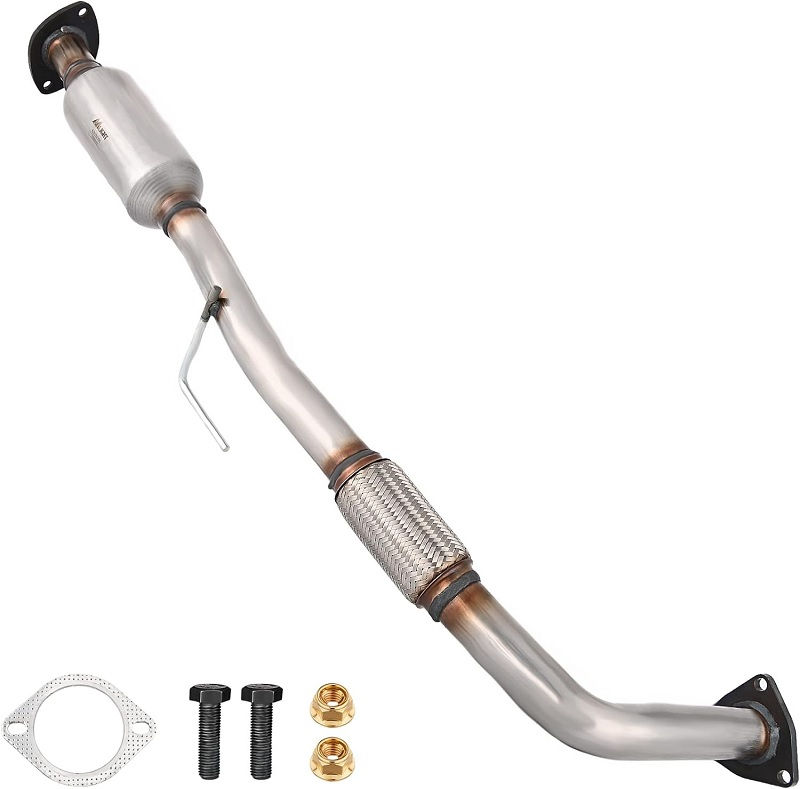This post contains affiliate links. This means I will make a commission at no extra cost to you should you click through and make a purchase [ “As an Amazon Associate, I earn from qualifying purchases.” ]. Read the full disclosure here.
2001 Toyota Camry Catalytic Converter GuideMechanic.Com The catalytic converter is an essential component of any vehicle’s exhaust system, including the 2001 Toyota Camry. It plays a crucial role in reducing harmful emissions and ensuring your car meets environmental regulations.
In this comprehensive guide, we will dive deep into the 2001 Toyota Camry catalytic converter, discussing its functions, common issues, maintenance tips, and more.
Before we delve into the specifics, let’s first understand what a catalytic converter does. Essentially, it is responsible for converting the harmful gases produced during the combustion process into less harmful substances through a series of chemical reactions. This helps in reducing air pollution and minimizing the impact of your vehicle on the environment.
See Also: Toyota Camry Power Steering Fluid
2001 Toyota Camry Catalytic Converter: Signs of a Failing Catalytic Converter
Check out this Nilight Catalytic Converter for Toyota Camry 2.2L 1997 1998 1999 2000 2001, Solara 2.2L 1999-2001,Custom Fit Cat (EPA Standard)

While catalytic converters are durable components, they can develop issues over time. It is important to be aware of the signs that indicate a failing catalytic converter in the 2001 Toyota Camry. Detecting these signs early can help prevent further damage and ensure prompt repairs or replacements.
Decreased Engine Performance
A failing catalytic converter can negatively impact the performance of the 2001 Toyota Camry’s engine. You may notice a decrease in power, reduced acceleration, or difficulty starting the vehicle. This can be attributed to the restricted flow of exhaust gases caused by a clogged or damaged converter.
If you experience a significant drop in engine performance, it is advisable to have the catalytic converter inspected by a qualified mechanic to determine the cause and take appropriate action.
Strange Smells
A failing catalytic converter can produce unusual odors, often described as a rotten egg or sulfur-like smell. This odor is caused by the presence of hydrogen sulfide in the exhaust gases due to incomplete catalytic conversion.
If you notice strong, persistent odors coming from your 2001 Toyota Camry’s exhaust, it is a clear indication that the catalytic converter may require attention. Ignoring these smells can lead to further damage and potential safety hazards.
Warning Lights
The onboard diagnostic system in the 2001 Toyota Camry is equipped with sensors that monitor the performance of the catalytic converter. If the system detects any issues or malfunctions, it will trigger a warning light on the dashboard, usually labeled as “Check Engine” or displaying an engine symbol.
If the check engine light illuminates, it is essential to have the vehicle diagnosed by a professional as soon as possible. The warning light could indicate a failing catalytic converter or other underlying issues that require attention.
Causes of Catalytic Converter Failure

Understanding the causes of catalytic converter failure in the 2001 Toyota Camry can help you take preventive measures and prolong its lifespan. Several factors can contribute to converter failure, ranging from internal issues to external influences.
Engine Misfires
Repeated engine misfires can lead to catalytic converter failure. When the engine misfires, unburned fuel enters the exhaust system, raising the temperature in the converter to dangerous levels. This excessive heat can cause the catalyst to melt or disintegrate, rendering the converter ineffective.
Regular maintenance, including timely spark plug replacement and addressing any engine misfire issues, is crucial in preventing damage to the catalytic converter.
Poor Fuel Quality
The quality of fuel used in the 2001 Toyota Camry can significantly impact the lifespan of the catalytic converter. Low-quality or contaminated fuel may contain additives or impurities that can damage the catalyst or clog the substrate.
Using high-quality fuel from reputable sources and avoiding contaminated or adulterated fuel can help prevent potential issues and maintain the optimal performance of the catalytic converter.
Improper Maintenance
Proper maintenance is essential for the longevity of the catalytic converter. Neglecting routine maintenance tasks, such as regular oil changes, air filter replacements, and spark plug inspections, can lead to engine issues that can indirectly affect the converter.
See Also: P0354 Toyota Camry: What Is P0354 And How Does It Impact
Regular maintenance ensures the overall health of the vehicle, reducing the likelihood of engine problems that can potentially damage the catalytic converter.
How to Maintain Your Catalytic Converter

Maintaining the catalytic converter in the 2001 Toyota Camry is crucial for its optimal performance and longevity. By following these maintenance tips, you can minimize the risk of converter failure and ensure compliance with emission standards.
Regular Inspections
Periodically inspectthe catalytic converter in the 2001 Toyota Camry to check for any signs of damage or clogging. Look for physical damage such as dents, cracks, or leaks, as well as any buildup of soot or debris on the surface. Inspecting the converter visually can help identify potential issues early on and allow for prompt repairs or replacements if necessary.
Using the Correct Fuel
Using the appropriate fuel for your 2001 Toyota Camry is essential for maintaining the health of the catalytic converter. Follow the manufacturer’s recommendations regarding the type of fuel to use, whether it is regular unleaded gasoline or a specific octane rating. Using the wrong fuel, such as diesel in a gasoline-powered vehicle, can cause severe damage to the converter and other engine components.
Additionally, be cautious of filling up at reputable gas stations to ensure the fuel quality is reliable and free from contaminants. Poor quality fuel can introduce harmful substances into the converter, leading to premature failure.
Avoiding Catalyst Contaminants
Minimizing exposure to catalyst contaminants is crucial for the longevity and performance of the catalytic converter. Certain substances can act as catalyst poisons, inhibiting the converter’s ability to facilitate the necessary chemical reactions for emissions reduction.
Avoid introducing substances such as leaded gasoline, engine coolant, motor oil, or silicone-based products into the exhaust system. These contaminants can coat the catalyst and reduce its effectiveness. Additionally, refrain from using fuel additives or aftermarket performance-enhancing products that claim to improve catalytic converter efficiency, as they may contain components that can damage the converter.
DIY Catalytic Converter Replacement
Replacing a catalytic converter in the 2001 Toyota Camry can be a challenging task, but for those with sufficient mechanical skills and experience, it is possible to perform the replacement themselves. However, it is important to note that this DIY approach requires proper tools, safety precautions, and knowledge of the vehicle’s exhaust system.
Step-by-Step Instructions
When replacing the catalytic converter, start by ensuring the vehicle is parked on a level surface and the engine is cool. Follow these general steps, but refer to the vehicle’s service manual for specific instructions:
- Disconnect the negative terminal of the vehicle’s battery to prevent any electrical hazards.
- Raise the vehicle using a jack and secure it with jack stands.
- Locate the catalytic converter, which is usually positioned between the exhaust manifold and the muffler.
- Remove any heat shields or brackets that may be obstructing access to the converter.
- Disconnect the oxygen sensors and any other connectors or bolts securing the converter to the exhaust system.
- Remove the old catalytic converter and replace it with the new one, ensuring proper alignment and connection.
- Reconnect the oxygen sensors and any other components that were disconnected.
- Reinstall any heat shields or brackets that were removed.
- Lower the vehicle and reconnect the negative terminal of the battery.
It is crucial to exercise caution and follow proper safety procedures when working underneath the vehicle. If you are unsure about any aspect of the replacement process, it is recommended to seek professional assistance to ensure a successful and safe installation.
Legal Regulations and Catalytic Converters
Catalytic converters are subject to legal regulations to ensure vehicles meet emission standards and reduce harmful pollutants. It is essential to understand the legal requirements associated with catalytic converters in the 2001 Toyota Camry, as non-compliance can lead to legal consequences.
Emission Standards
Emission standards are set by regulatory authorities to limit the amount of pollutants vehicles can emit. These standards vary by region and can differ between countries or even states/provinces within a country.
It is vital to ensure that the catalytic converter in the 2001 Toyota Camry complies with the emission standards applicable to your specific location. Non-compliant catalytic converters can result in fines, vehicle impoundment, or other legal penalties.
State-Specific Regulations
In addition to federal emission standards, some states or provinces may have their own specific regulations regarding catalytic converters. These regulations can include requirements for certification, type of catalytic converter allowed, and even restrictions on modifications or tampering with the converter.
Before replacing or modifying the catalytic converter in your 2001 Toyota Camry, it is crucial to research and understand the regulations applicable to your state or province. This will ensure compliance and prevent any legal issues that may arise from non-compliance.
Upgrading Your Catalytic Converter
While the 2001 Toyota Camry is equipped with a factory-installed catalytic converter that meets emission standards, some individuals may consider upgrading to an aftermarket converter for various reasons. It is important to understand the potential benefits and considerations before making a decision.
Improved Performance
Aftermarket catalytic converters may offer performance benefits over the stock converter. These benefits can include increased flow and reduced restriction, resulting in improved engine performance and potentially enhanced fuel efficiency.
See Also: VSC Off Toyota Corolla 2010
However, it is crucial to ensure that any aftermarket converter chosen is designed specifically for the 2001 Toyota Camry, compatible with its engine specifications, and compliant with legal requirements. Consult with reputable manufacturers or automotive experts to determine the best aftermarket option for your specific needs.
Aftermarket Options
When considering an aftermarket catalytic converter, there are various options available. These can range from high-flow converters designed for increased performance to direct-fit converters that are designed to replace the stock converter without any modifications.
Research and consult with experts to identify reputable manufacturers and select an aftermarket catalytic converter that meets your requirements while remaining compliant with emission standards and legal regulations.
Potential Modifications
Upgrading the catalytic converter may open the door to other modifications in the exhaust system. Some individuals may opt for a complete exhaust system upgrade to maximize performance gains, while others may choose to modify the catalytic converter itself with the addition of aftermarket components.
When considering modifications, it is crucial to research and understand the potential impacts on emissions, vehicle warranty, and legal compliance. Some modifications may void warranties or result in non-compliance with emission standards, leading to legal consequences.
Frequently Asked Questions
Here are answers to some frequently asked questions about catalytic converters in the 2001 Toyota Camry:
1. How long does a catalytic converter last?
The lifespan of a catalytic converter can vary depending on various factors, such as driving conditions, maintenance practices, and fuel quality. Generally, a well-maintained converter can last between 70,000 to 100,000 miles or more. However, it is essential to monitor for signs of failure and address any issues promptly.
2. Can a clogged catalytic converter be cleaned?
Once a catalytic converter becomes severely clogged or damaged, cleaning it may not be effective. In such cases, replacement is often necessary to restore proper functionality.
3. Can I drive with a bad catalytic converter?
While it may be possible to drive with a failing catalytic converter, it is not recommended. A faulty converter can negatively impact the vehicle’s performance, fuel efficiency, and emissions. Additionally, driving with a failing converter can potentially cause further damage to the engine or other components.
4. Can I remove the catalytic converter?
Removing the catalytic converter is illegal in most regions, as it violates emission regulations. It can result in fines, penalties, and even vehicle impoundment. Additionally, removing the converter will cause the vehicle to fail emission tests and may void your warranty.
5. How much does it cost to replace a catalytic converter?
The cost of replacing a catalytic converter can vary depending on factors such as the type of converter, labor costs, and additional expenses. On average, the cost for a replacement catalytic converter can range from $500 to $2,500 or more, depending on the vehicle’s make and model.
It is essential to obtain quotes from reputable mechanics or service centers to get an accurate estimate based on your specific vehicle and location. Additionally, consider factors such as the warranty provided with the replacement catalytic converter and the reputation of the manufacturer or brand.
6. Can I install a used catalytic converter?
While it is possible to install a used catalytic converter, it is not recommended. Used converters may have limited remaining life or potential issues that could lead to premature failure. Additionally, using a used converter may not comply with legal requirements and can result in non-compliance with emission standards.
7. How can I prevent catalytic converter theft?
Catalytic converter theft has unfortunately become a prevalent issue in recent years. To help prevent theft, consider the following measures:
- Park your vehicle in well-lit and secure areas.
- Install a catalytic converter anti-theft device, such as a shield or cage.
- Engrave your vehicle identification number (VIN) on the converter.
- Consider etching a unique marking on the converter for easy identification.
- Install surveillance cameras or alarms to deter thieves.
These precautions can help reduce the risk of catalytic converter theft and protect your vehicle.
8. Can I sell my old catalytic converter?
Used catalytic converters may have some value due to the precious metals they contain. However, selling them can be challenging, as there are legal restrictions and requirements surrounding the sale of used converters.
See Also: Toyota Yaris Dashboard Lights
It is advisable to research local regulations and consult with reputable recycling companies or scrap yards that specialize in catalytic converter recycling. They can provide guidance on the legal aspects and potentially offer compensation for your old catalytic converter.
9. How can I tell if my catalytic converter is original?
Identifying whether a catalytic converter is original or aftermarket can be challenging, as it depends on various factors such as the vehicle’s age, previous maintenance history, and any modifications that may have been made. However, there are a few signs that may indicate the presence of an aftermarket converter:
- Different branding or markings compared to the original equipment.
- Non-OEM packaging or labeling.
- Alterations or modifications to the exhaust system.
- Differences in physical appearance or design compared to the original.
If you have concerns about the authenticity of your catalytic converter, it is advisable to consult with a qualified mechanic or contact the vehicle manufacturer for clarification.
10. Can a catalytic converter be repaired?
In most cases, catalytic converters cannot be repaired. Once they are damaged or malfunctioning, replacement is usually the recommended solution. Attempting to repair a converter can be challenging, and the repaired unit may not perform optimally or meet emission standards.
If you suspect an issue with your catalytic converter, it is best to have it inspected by a qualified professional who can assess the extent of the damage and recommend the appropriate course of action.
In conclusion, understanding the intricacies of the 2001 Toyota Camry catalytic converter is crucial for maintaining vehicle performance, complying with emission standards, and promoting a cleaner environment.
Regular inspections, proper maintenance, and timely repairs or replacements are essential to ensure the converter’s optimal functionality. By following the guidelines provided in this comprehensive guide, you can make informed decisions about your catalytic converter and contribute to reducing harmful emissions for a greener future.
See Also: Toyota Highlander Braking Power Low
- P0000 Through P0099: Understanding OBD-II Trouble Codes - February 11, 2025
- P0000 Through P0199: Understanding OBD-II Trouble Codes - February 10, 2025
- P0080 Exhaust Valve Control Solenoid Circuit High (Bank 1) - February 9, 2025
